Case Study: Ethical Dilemmas and the Seven-Eleven Wage Scandal
VerifiedAdded on 2023/04/24
|12
|2696
|399
Case Study
AI Summary
This case study analyzes the Seven-Eleven scandal, focusing on wage fraud and labor exploitation of foreign workers. It examines the history of the organization and the events leading to the scandal, including underpayment issues and fraudulent cashback schemes. Ethical decision-making approaches such as utilitarian theory, subjectivism theory, and agency theory are applied to understand the motivations and consequences of the unethical practices. The study concludes that Seven-Eleven needs to prioritize ethical business practices to restore consumer trust and ensure long-term sustainability, emphasizing the importance of balancing profit maximization with employee welfare and legal compliance. Desklib provides access to similar case studies and solved assignments for students.
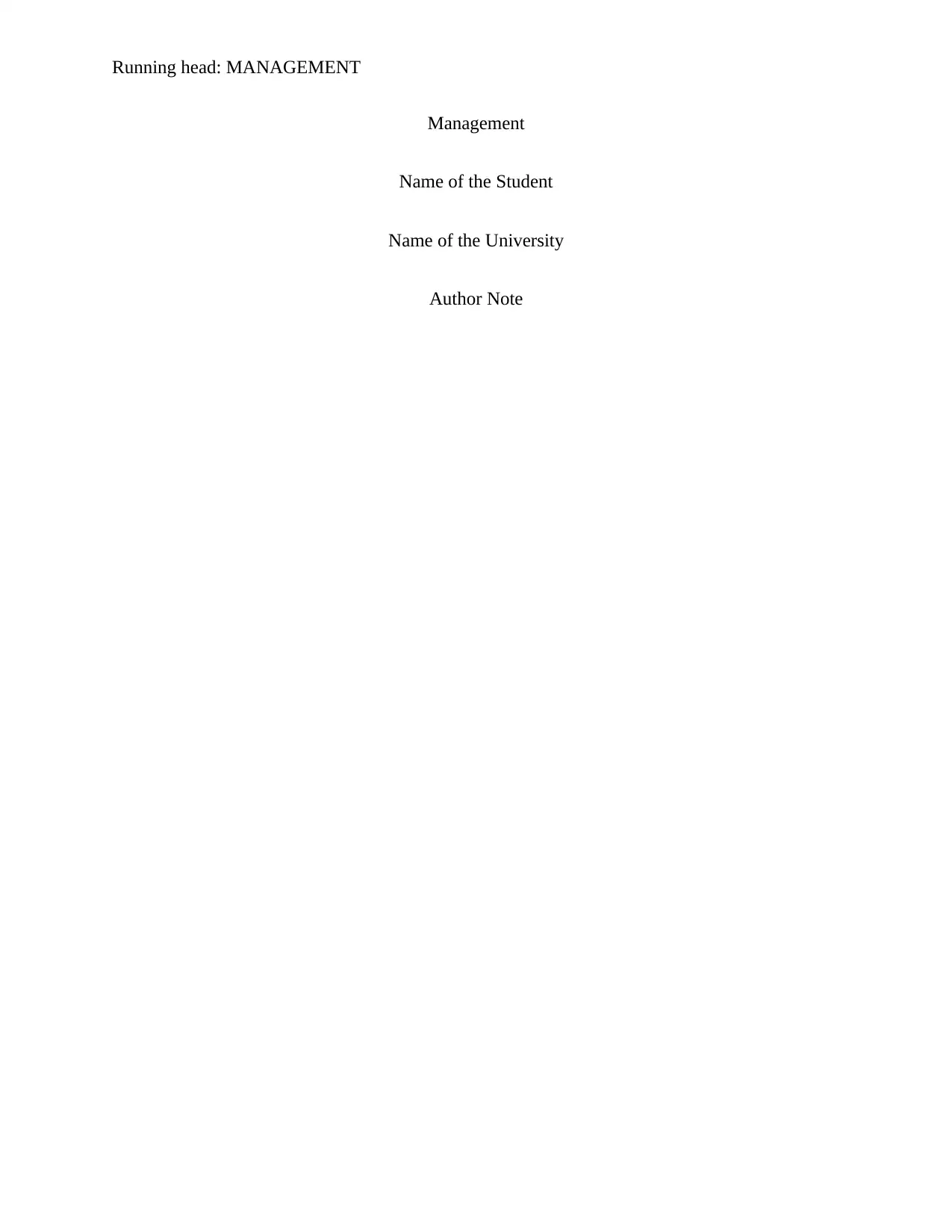
Running head: MANAGEMENT
Management
Name of the Student
Name of the University
Author Note
Management
Name of the Student
Name of the University
Author Note
Paraphrase This Document
Need a fresh take? Get an instant paraphrase of this document with our AI Paraphraser
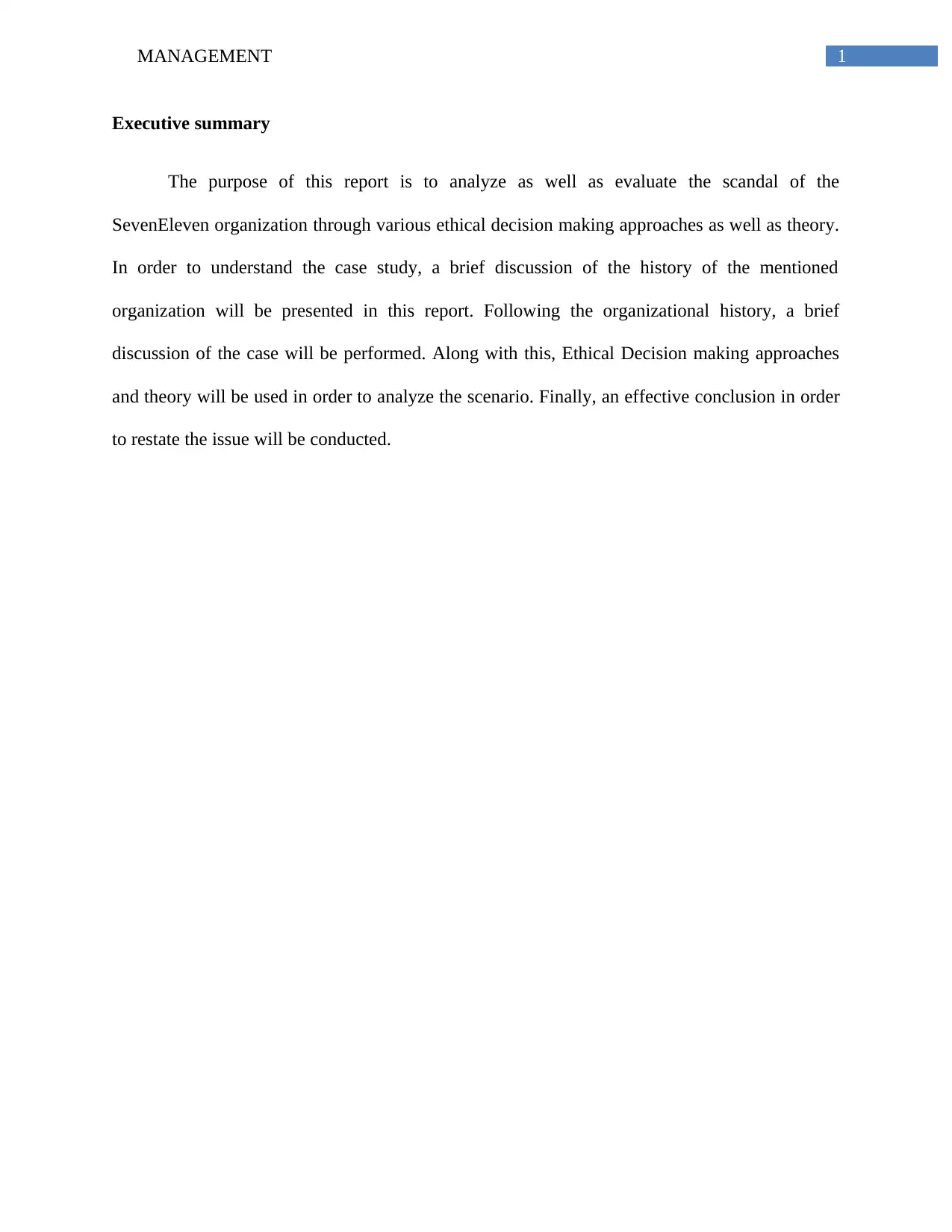
1MANAGEMENT
Executive summary
The purpose of this report is to analyze as well as evaluate the scandal of the
SevenEleven organization through various ethical decision making approaches as well as theory.
In order to understand the case study, a brief discussion of the history of the mentioned
organization will be presented in this report. Following the organizational history, a brief
discussion of the case will be performed. Along with this, Ethical Decision making approaches
and theory will be used in order to analyze the scenario. Finally, an effective conclusion in order
to restate the issue will be conducted.
Executive summary
The purpose of this report is to analyze as well as evaluate the scandal of the
SevenEleven organization through various ethical decision making approaches as well as theory.
In order to understand the case study, a brief discussion of the history of the mentioned
organization will be presented in this report. Following the organizational history, a brief
discussion of the case will be performed. Along with this, Ethical Decision making approaches
and theory will be used in order to analyze the scenario. Finally, an effective conclusion in order
to restate the issue will be conducted.
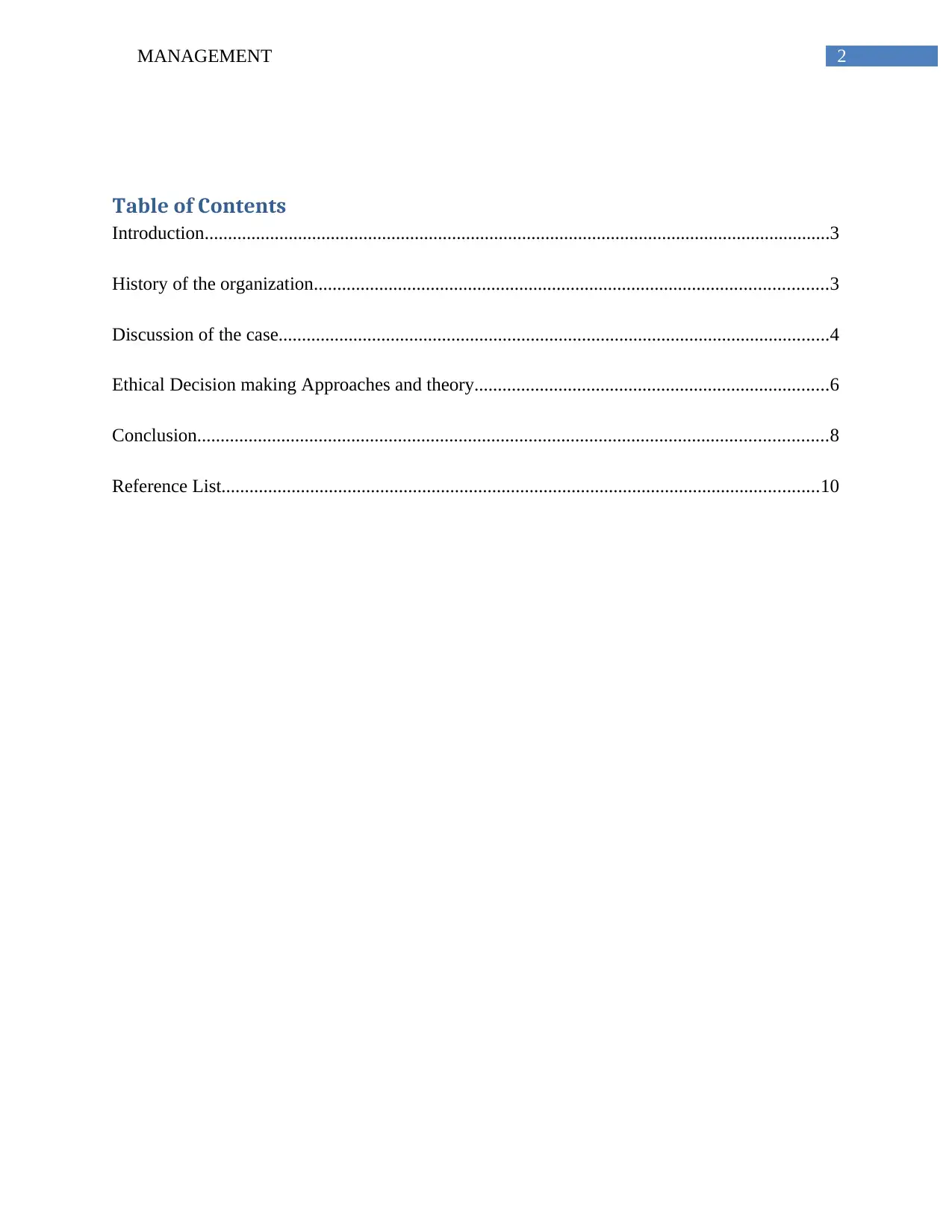
2MANAGEMENT
Table of Contents
Introduction......................................................................................................................................3
History of the organization..............................................................................................................3
Discussion of the case......................................................................................................................4
Ethical Decision making Approaches and theory............................................................................6
Conclusion.......................................................................................................................................8
Reference List................................................................................................................................10
Table of Contents
Introduction......................................................................................................................................3
History of the organization..............................................................................................................3
Discussion of the case......................................................................................................................4
Ethical Decision making Approaches and theory............................................................................6
Conclusion.......................................................................................................................................8
Reference List................................................................................................................................10
⊘ This is a preview!⊘
Do you want full access?
Subscribe today to unlock all pages.

Trusted by 1+ million students worldwide
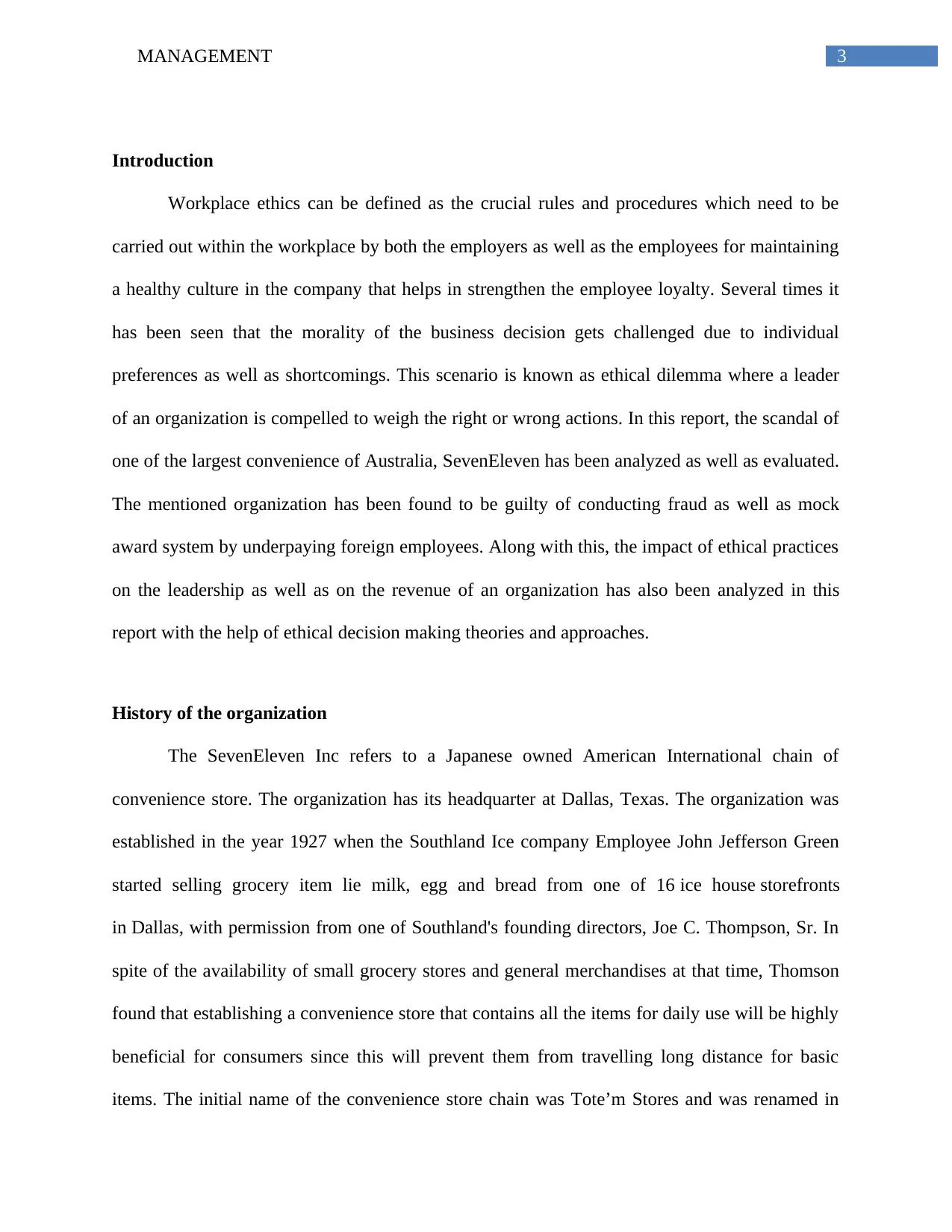
3MANAGEMENT
Introduction
Workplace ethics can be defined as the crucial rules and procedures which need to be
carried out within the workplace by both the employers as well as the employees for maintaining
a healthy culture in the company that helps in strengthen the employee loyalty. Several times it
has been seen that the morality of the business decision gets challenged due to individual
preferences as well as shortcomings. This scenario is known as ethical dilemma where a leader
of an organization is compelled to weigh the right or wrong actions. In this report, the scandal of
one of the largest convenience of Australia, SevenEleven has been analyzed as well as evaluated.
The mentioned organization has been found to be guilty of conducting fraud as well as mock
award system by underpaying foreign employees. Along with this, the impact of ethical practices
on the leadership as well as on the revenue of an organization has also been analyzed in this
report with the help of ethical decision making theories and approaches.
History of the organization
The SevenEleven Inc refers to a Japanese owned American International chain of
convenience store. The organization has its headquarter at Dallas, Texas. The organization was
established in the year 1927 when the Southland Ice company Employee John Jefferson Green
started selling grocery item lie milk, egg and bread from one of 16 ice house storefronts
in Dallas, with permission from one of Southland's founding directors, Joe C. Thompson, Sr. In
spite of the availability of small grocery stores and general merchandises at that time, Thomson
found that establishing a convenience store that contains all the items for daily use will be highly
beneficial for consumers since this will prevent them from travelling long distance for basic
items. The initial name of the convenience store chain was Tote’m Stores and was renamed in
Introduction
Workplace ethics can be defined as the crucial rules and procedures which need to be
carried out within the workplace by both the employers as well as the employees for maintaining
a healthy culture in the company that helps in strengthen the employee loyalty. Several times it
has been seen that the morality of the business decision gets challenged due to individual
preferences as well as shortcomings. This scenario is known as ethical dilemma where a leader
of an organization is compelled to weigh the right or wrong actions. In this report, the scandal of
one of the largest convenience of Australia, SevenEleven has been analyzed as well as evaluated.
The mentioned organization has been found to be guilty of conducting fraud as well as mock
award system by underpaying foreign employees. Along with this, the impact of ethical practices
on the leadership as well as on the revenue of an organization has also been analyzed in this
report with the help of ethical decision making theories and approaches.
History of the organization
The SevenEleven Inc refers to a Japanese owned American International chain of
convenience store. The organization has its headquarter at Dallas, Texas. The organization was
established in the year 1927 when the Southland Ice company Employee John Jefferson Green
started selling grocery item lie milk, egg and bread from one of 16 ice house storefronts
in Dallas, with permission from one of Southland's founding directors, Joe C. Thompson, Sr. In
spite of the availability of small grocery stores and general merchandises at that time, Thomson
found that establishing a convenience store that contains all the items for daily use will be highly
beneficial for consumers since this will prevent them from travelling long distance for basic
items. The initial name of the convenience store chain was Tote’m Stores and was renamed in
Paraphrase This Document
Need a fresh take? Get an instant paraphrase of this document with our AI Paraphraser
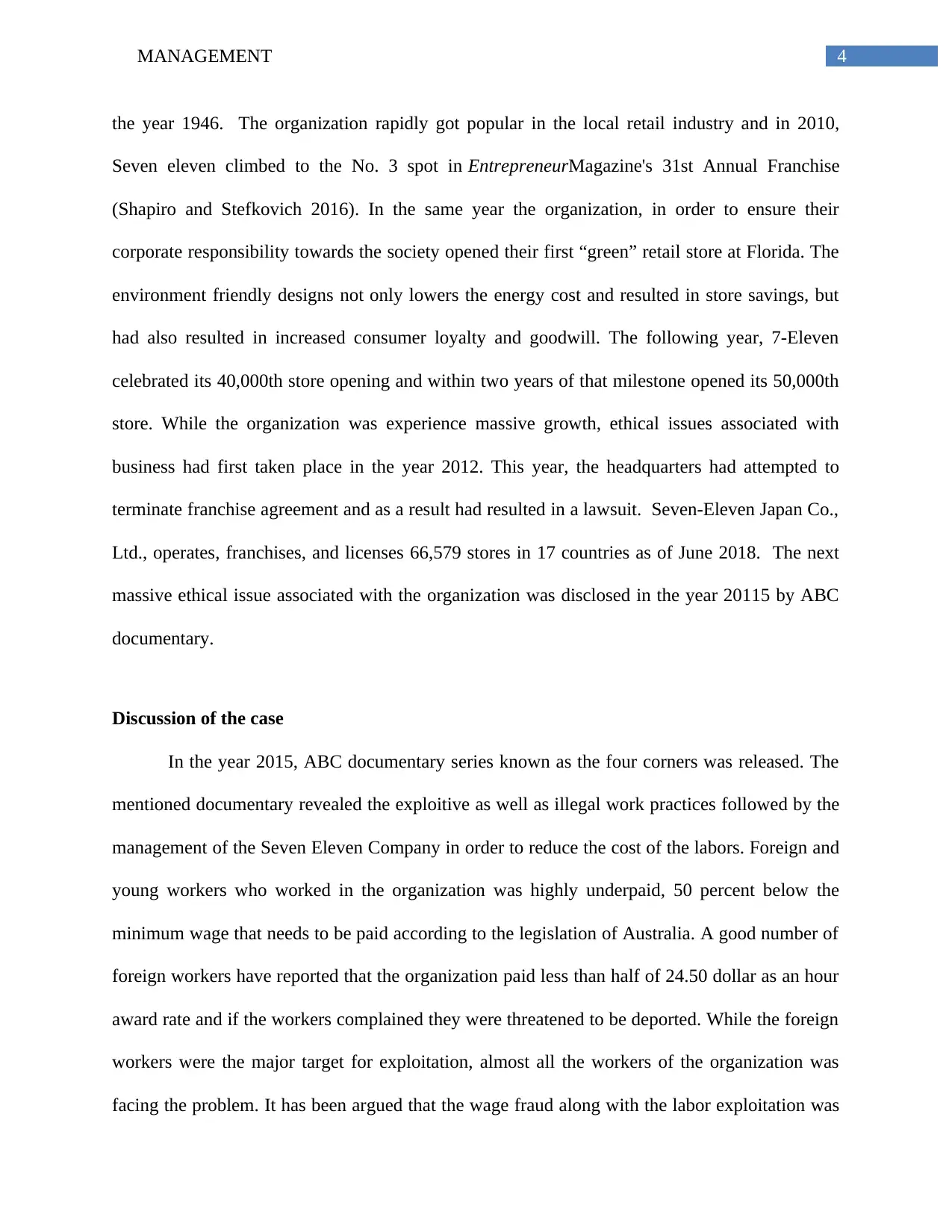
4MANAGEMENT
the year 1946. The organization rapidly got popular in the local retail industry and in 2010,
Seven eleven climbed to the No. 3 spot in EntrepreneurMagazine's 31st Annual Franchise
(Shapiro and Stefkovich 2016). In the same year the organization, in order to ensure their
corporate responsibility towards the society opened their first “green” retail store at Florida. The
environment friendly designs not only lowers the energy cost and resulted in store savings, but
had also resulted in increased consumer loyalty and goodwill. The following year, 7-Eleven
celebrated its 40,000th store opening and within two years of that milestone opened its 50,000th
store. While the organization was experience massive growth, ethical issues associated with
business had first taken place in the year 2012. This year, the headquarters had attempted to
terminate franchise agreement and as a result had resulted in a lawsuit. Seven-Eleven Japan Co.,
Ltd., operates, franchises, and licenses 66,579 stores in 17 countries as of June 2018. The next
massive ethical issue associated with the organization was disclosed in the year 20115 by ABC
documentary.
Discussion of the case
In the year 2015, ABC documentary series known as the four corners was released. The
mentioned documentary revealed the exploitive as well as illegal work practices followed by the
management of the Seven Eleven Company in order to reduce the cost of the labors. Foreign and
young workers who worked in the organization was highly underpaid, 50 percent below the
minimum wage that needs to be paid according to the legislation of Australia. A good number of
foreign workers have reported that the organization paid less than half of 24.50 dollar as an hour
award rate and if the workers complained they were threatened to be deported. While the foreign
workers were the major target for exploitation, almost all the workers of the organization was
facing the problem. It has been argued that the wage fraud along with the labor exploitation was
the year 1946. The organization rapidly got popular in the local retail industry and in 2010,
Seven eleven climbed to the No. 3 spot in EntrepreneurMagazine's 31st Annual Franchise
(Shapiro and Stefkovich 2016). In the same year the organization, in order to ensure their
corporate responsibility towards the society opened their first “green” retail store at Florida. The
environment friendly designs not only lowers the energy cost and resulted in store savings, but
had also resulted in increased consumer loyalty and goodwill. The following year, 7-Eleven
celebrated its 40,000th store opening and within two years of that milestone opened its 50,000th
store. While the organization was experience massive growth, ethical issues associated with
business had first taken place in the year 2012. This year, the headquarters had attempted to
terminate franchise agreement and as a result had resulted in a lawsuit. Seven-Eleven Japan Co.,
Ltd., operates, franchises, and licenses 66,579 stores in 17 countries as of June 2018. The next
massive ethical issue associated with the organization was disclosed in the year 20115 by ABC
documentary.
Discussion of the case
In the year 2015, ABC documentary series known as the four corners was released. The
mentioned documentary revealed the exploitive as well as illegal work practices followed by the
management of the Seven Eleven Company in order to reduce the cost of the labors. Foreign and
young workers who worked in the organization was highly underpaid, 50 percent below the
minimum wage that needs to be paid according to the legislation of Australia. A good number of
foreign workers have reported that the organization paid less than half of 24.50 dollar as an hour
award rate and if the workers complained they were threatened to be deported. While the foreign
workers were the major target for exploitation, almost all the workers of the organization was
facing the problem. It has been argued that the wage fraud along with the labor exploitation was
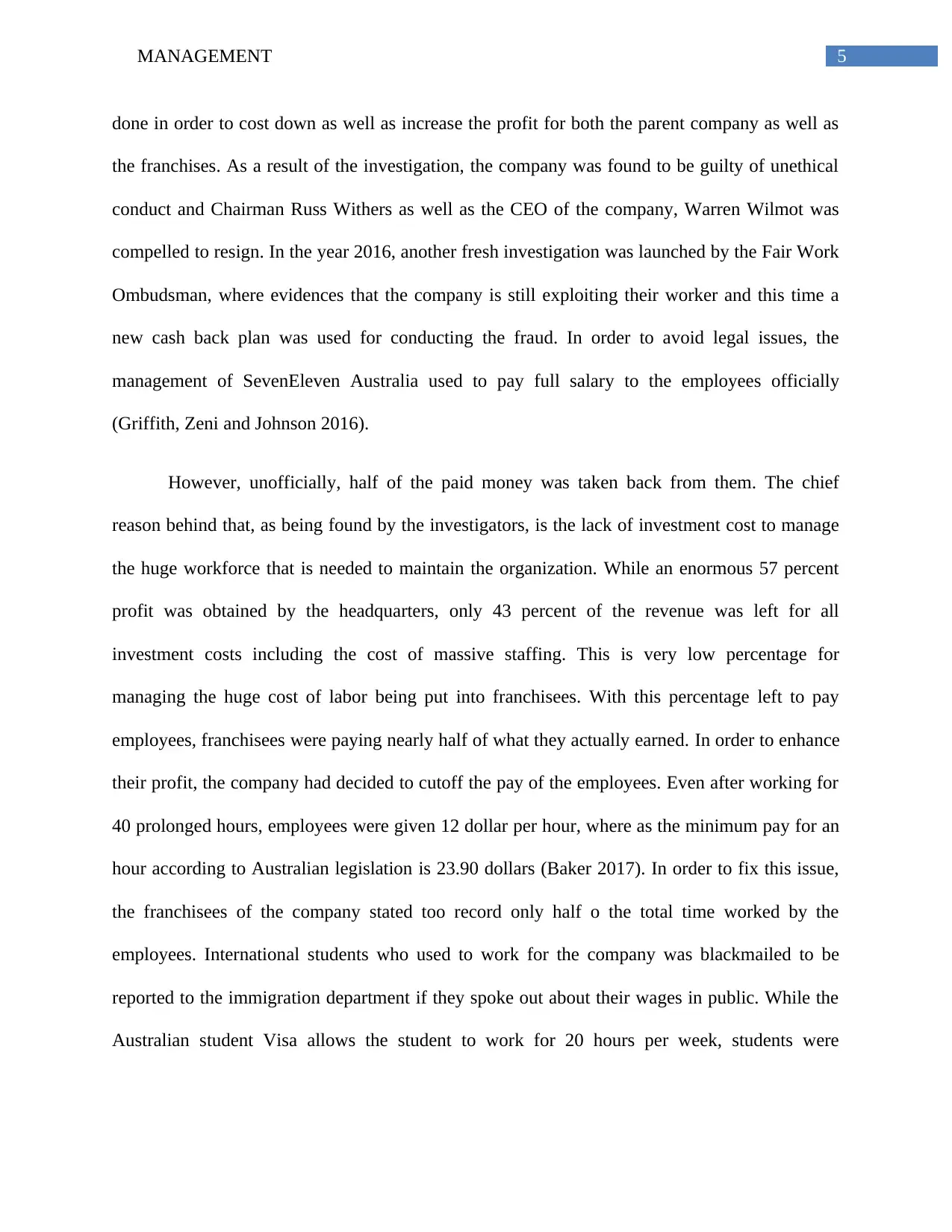
5MANAGEMENT
done in order to cost down as well as increase the profit for both the parent company as well as
the franchises. As a result of the investigation, the company was found to be guilty of unethical
conduct and Chairman Russ Withers as well as the CEO of the company, Warren Wilmot was
compelled to resign. In the year 2016, another fresh investigation was launched by the Fair Work
Ombudsman, where evidences that the company is still exploiting their worker and this time a
new cash back plan was used for conducting the fraud. In order to avoid legal issues, the
management of SevenEleven Australia used to pay full salary to the employees officially
(Griffith, Zeni and Johnson 2016).
However, unofficially, half of the paid money was taken back from them. The chief
reason behind that, as being found by the investigators, is the lack of investment cost to manage
the huge workforce that is needed to maintain the organization. While an enormous 57 percent
profit was obtained by the headquarters, only 43 percent of the revenue was left for all
investment costs including the cost of massive staffing. This is very low percentage for
managing the huge cost of labor being put into franchisees. With this percentage left to pay
employees, franchisees were paying nearly half of what they actually earned. In order to enhance
their profit, the company had decided to cutoff the pay of the employees. Even after working for
40 prolonged hours, employees were given 12 dollar per hour, where as the minimum pay for an
hour according to Australian legislation is 23.90 dollars (Baker 2017). In order to fix this issue,
the franchisees of the company stated too record only half o the total time worked by the
employees. International students who used to work for the company was blackmailed to be
reported to the immigration department if they spoke out about their wages in public. While the
Australian student Visa allows the student to work for 20 hours per week, students were
done in order to cost down as well as increase the profit for both the parent company as well as
the franchises. As a result of the investigation, the company was found to be guilty of unethical
conduct and Chairman Russ Withers as well as the CEO of the company, Warren Wilmot was
compelled to resign. In the year 2016, another fresh investigation was launched by the Fair Work
Ombudsman, where evidences that the company is still exploiting their worker and this time a
new cash back plan was used for conducting the fraud. In order to avoid legal issues, the
management of SevenEleven Australia used to pay full salary to the employees officially
(Griffith, Zeni and Johnson 2016).
However, unofficially, half of the paid money was taken back from them. The chief
reason behind that, as being found by the investigators, is the lack of investment cost to manage
the huge workforce that is needed to maintain the organization. While an enormous 57 percent
profit was obtained by the headquarters, only 43 percent of the revenue was left for all
investment costs including the cost of massive staffing. This is very low percentage for
managing the huge cost of labor being put into franchisees. With this percentage left to pay
employees, franchisees were paying nearly half of what they actually earned. In order to enhance
their profit, the company had decided to cutoff the pay of the employees. Even after working for
40 prolonged hours, employees were given 12 dollar per hour, where as the minimum pay for an
hour according to Australian legislation is 23.90 dollars (Baker 2017). In order to fix this issue,
the franchisees of the company stated too record only half o the total time worked by the
employees. International students who used to work for the company was blackmailed to be
reported to the immigration department if they spoke out about their wages in public. While the
Australian student Visa allows the student to work for 20 hours per week, students were
⊘ This is a preview!⊘
Do you want full access?
Subscribe today to unlock all pages.

Trusted by 1+ million students worldwide
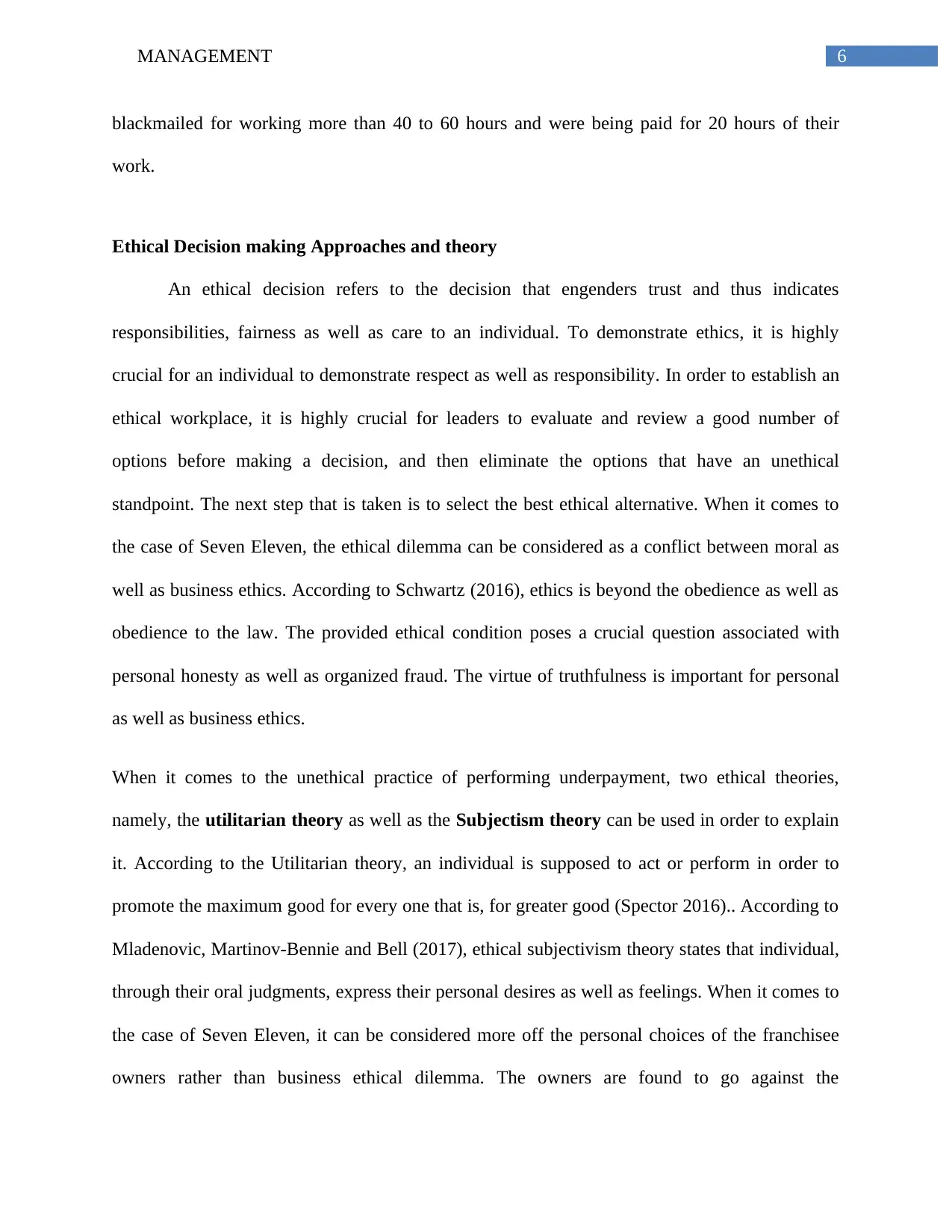
6MANAGEMENT
blackmailed for working more than 40 to 60 hours and were being paid for 20 hours of their
work.
Ethical Decision making Approaches and theory
An ethical decision refers to the decision that engenders trust and thus indicates
responsibilities, fairness as well as care to an individual. To demonstrate ethics, it is highly
crucial for an individual to demonstrate respect as well as responsibility. In order to establish an
ethical workplace, it is highly crucial for leaders to evaluate and review a good number of
options before making a decision, and then eliminate the options that have an unethical
standpoint. The next step that is taken is to select the best ethical alternative. When it comes to
the case of Seven Eleven, the ethical dilemma can be considered as a conflict between moral as
well as business ethics. According to Schwartz (2016), ethics is beyond the obedience as well as
obedience to the law. The provided ethical condition poses a crucial question associated with
personal honesty as well as organized fraud. The virtue of truthfulness is important for personal
as well as business ethics.
When it comes to the unethical practice of performing underpayment, two ethical theories,
namely, the utilitarian theory as well as the Subjectism theory can be used in order to explain
it. According to the Utilitarian theory, an individual is supposed to act or perform in order to
promote the maximum good for every one that is, for greater good (Spector 2016).. According to
Mladenovic, Martinov-Bennie and Bell (2017), ethical subjectivism theory states that individual,
through their oral judgments, express their personal desires as well as feelings. When it comes to
the case of Seven Eleven, it can be considered more off the personal choices of the franchisee
owners rather than business ethical dilemma. The owners are found to go against the
blackmailed for working more than 40 to 60 hours and were being paid for 20 hours of their
work.
Ethical Decision making Approaches and theory
An ethical decision refers to the decision that engenders trust and thus indicates
responsibilities, fairness as well as care to an individual. To demonstrate ethics, it is highly
crucial for an individual to demonstrate respect as well as responsibility. In order to establish an
ethical workplace, it is highly crucial for leaders to evaluate and review a good number of
options before making a decision, and then eliminate the options that have an unethical
standpoint. The next step that is taken is to select the best ethical alternative. When it comes to
the case of Seven Eleven, the ethical dilemma can be considered as a conflict between moral as
well as business ethics. According to Schwartz (2016), ethics is beyond the obedience as well as
obedience to the law. The provided ethical condition poses a crucial question associated with
personal honesty as well as organized fraud. The virtue of truthfulness is important for personal
as well as business ethics.
When it comes to the unethical practice of performing underpayment, two ethical theories,
namely, the utilitarian theory as well as the Subjectism theory can be used in order to explain
it. According to the Utilitarian theory, an individual is supposed to act or perform in order to
promote the maximum good for every one that is, for greater good (Spector 2016).. According to
Mladenovic, Martinov-Bennie and Bell (2017), ethical subjectivism theory states that individual,
through their oral judgments, express their personal desires as well as feelings. When it comes to
the case of Seven Eleven, it can be considered more off the personal choices of the franchisee
owners rather than business ethical dilemma. The owners are found to go against the
Paraphrase This Document
Need a fresh take? Get an instant paraphrase of this document with our AI Paraphraser
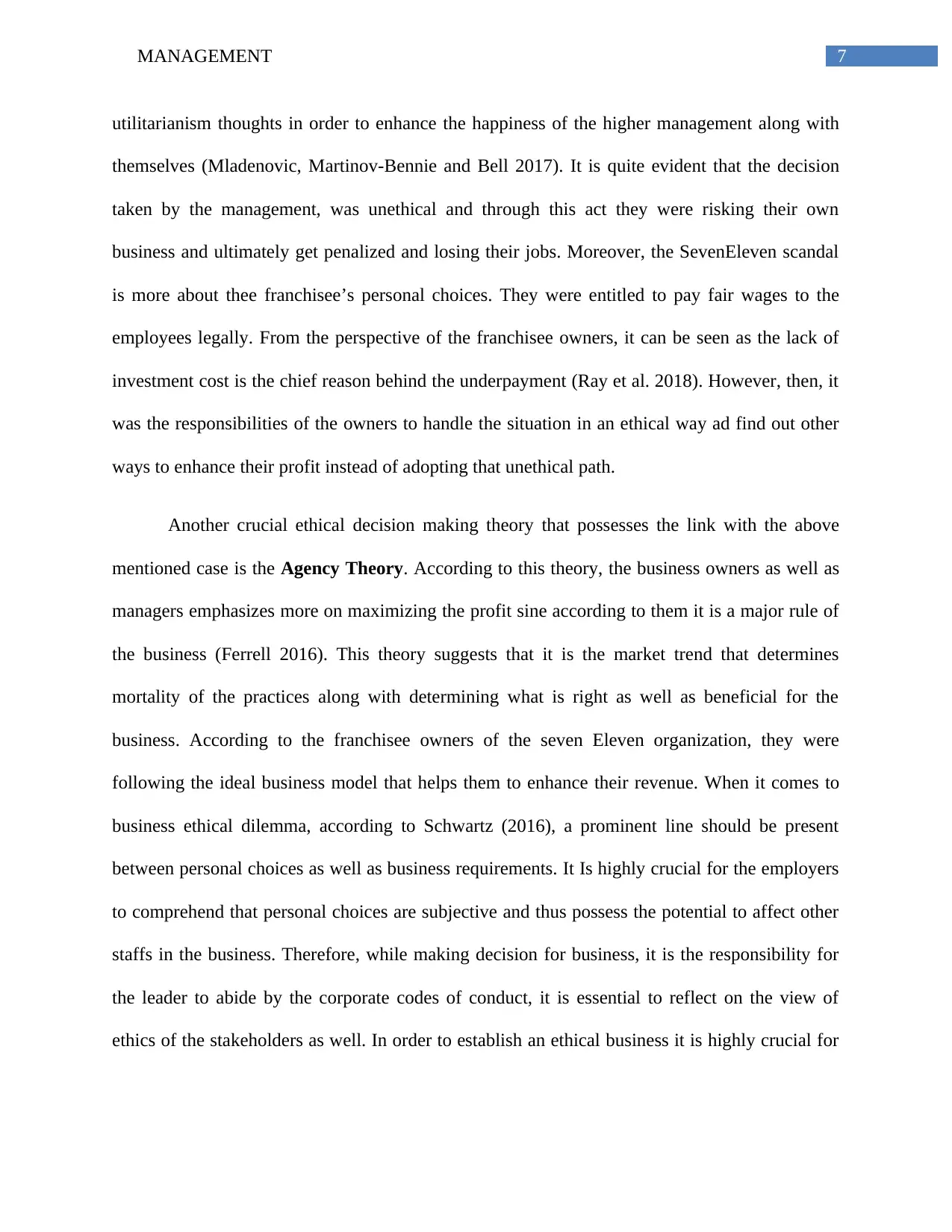
7MANAGEMENT
utilitarianism thoughts in order to enhance the happiness of the higher management along with
themselves (Mladenovic, Martinov-Bennie and Bell 2017). It is quite evident that the decision
taken by the management, was unethical and through this act they were risking their own
business and ultimately get penalized and losing their jobs. Moreover, the SevenEleven scandal
is more about thee franchisee’s personal choices. They were entitled to pay fair wages to the
employees legally. From the perspective of the franchisee owners, it can be seen as the lack of
investment cost is the chief reason behind the underpayment (Ray et al. 2018). However, then, it
was the responsibilities of the owners to handle the situation in an ethical way ad find out other
ways to enhance their profit instead of adopting that unethical path.
Another crucial ethical decision making theory that possesses the link with the above
mentioned case is the Agency Theory. According to this theory, the business owners as well as
managers emphasizes more on maximizing the profit sine according to them it is a major rule of
the business (Ferrell 2016). This theory suggests that it is the market trend that determines
mortality of the practices along with determining what is right as well as beneficial for the
business. According to the franchisee owners of the seven Eleven organization, they were
following the ideal business model that helps them to enhance their revenue. When it comes to
business ethical dilemma, according to Schwartz (2016), a prominent line should be present
between personal choices as well as business requirements. It Is highly crucial for the employers
to comprehend that personal choices are subjective and thus possess the potential to affect other
staffs in the business. Therefore, while making decision for business, it is the responsibility for
the leader to abide by the corporate codes of conduct, it is essential to reflect on the view of
ethics of the stakeholders as well. In order to establish an ethical business it is highly crucial for
utilitarianism thoughts in order to enhance the happiness of the higher management along with
themselves (Mladenovic, Martinov-Bennie and Bell 2017). It is quite evident that the decision
taken by the management, was unethical and through this act they were risking their own
business and ultimately get penalized and losing their jobs. Moreover, the SevenEleven scandal
is more about thee franchisee’s personal choices. They were entitled to pay fair wages to the
employees legally. From the perspective of the franchisee owners, it can be seen as the lack of
investment cost is the chief reason behind the underpayment (Ray et al. 2018). However, then, it
was the responsibilities of the owners to handle the situation in an ethical way ad find out other
ways to enhance their profit instead of adopting that unethical path.
Another crucial ethical decision making theory that possesses the link with the above
mentioned case is the Agency Theory. According to this theory, the business owners as well as
managers emphasizes more on maximizing the profit sine according to them it is a major rule of
the business (Ferrell 2016). This theory suggests that it is the market trend that determines
mortality of the practices along with determining what is right as well as beneficial for the
business. According to the franchisee owners of the seven Eleven organization, they were
following the ideal business model that helps them to enhance their revenue. When it comes to
business ethical dilemma, according to Schwartz (2016), a prominent line should be present
between personal choices as well as business requirements. It Is highly crucial for the employers
to comprehend that personal choices are subjective and thus possess the potential to affect other
staffs in the business. Therefore, while making decision for business, it is the responsibility for
the leader to abide by the corporate codes of conduct, it is essential to reflect on the view of
ethics of the stakeholders as well. In order to establish an ethical business it is highly crucial for
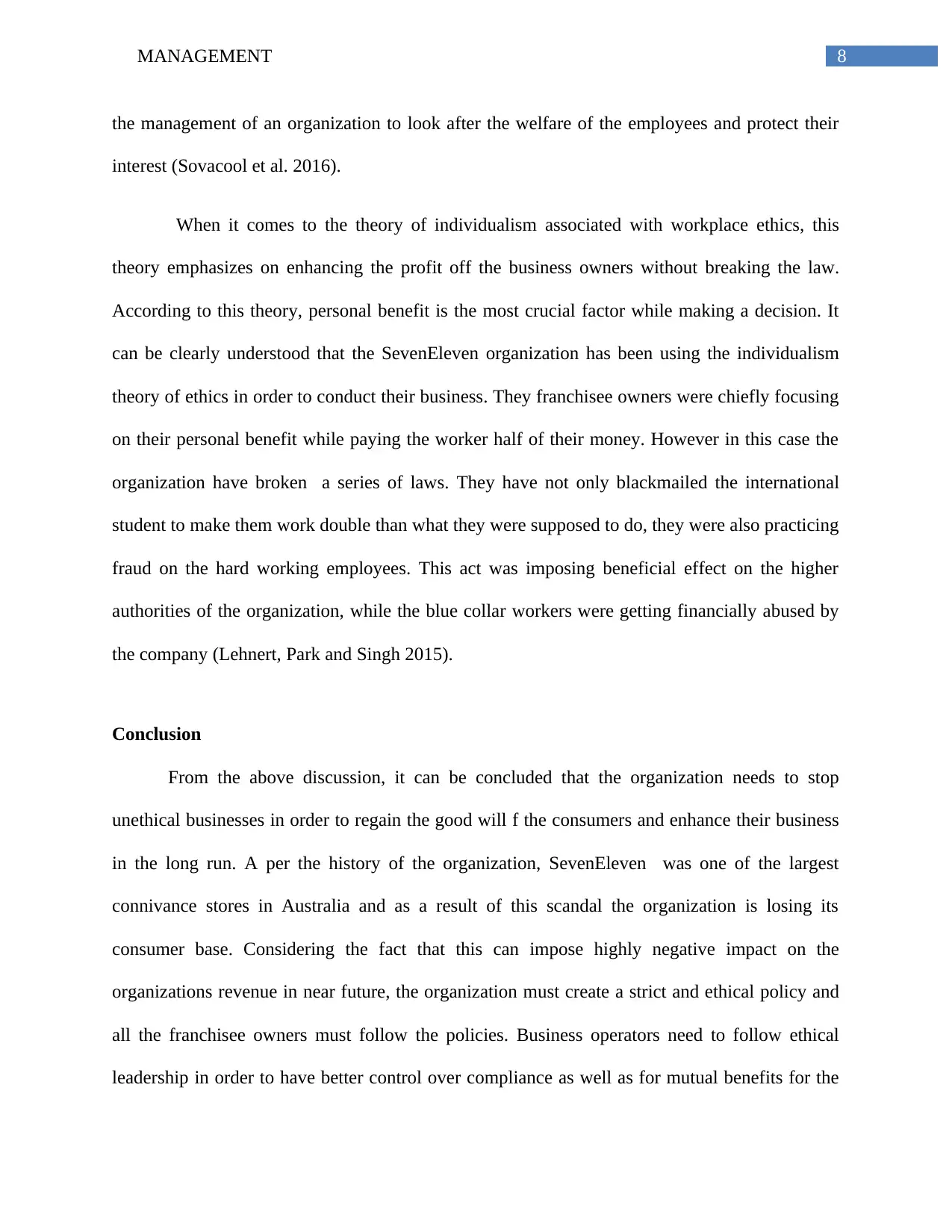
8MANAGEMENT
the management of an organization to look after the welfare of the employees and protect their
interest (Sovacool et al. 2016).
When it comes to the theory of individualism associated with workplace ethics, this
theory emphasizes on enhancing the profit off the business owners without breaking the law.
According to this theory, personal benefit is the most crucial factor while making a decision. It
can be clearly understood that the SevenEleven organization has been using the individualism
theory of ethics in order to conduct their business. They franchisee owners were chiefly focusing
on their personal benefit while paying the worker half of their money. However in this case the
organization have broken a series of laws. They have not only blackmailed the international
student to make them work double than what they were supposed to do, they were also practicing
fraud on the hard working employees. This act was imposing beneficial effect on the higher
authorities of the organization, while the blue collar workers were getting financially abused by
the company (Lehnert, Park and Singh 2015).
Conclusion
From the above discussion, it can be concluded that the organization needs to stop
unethical businesses in order to regain the good will f the consumers and enhance their business
in the long run. A per the history of the organization, SevenEleven was one of the largest
connivance stores in Australia and as a result of this scandal the organization is losing its
consumer base. Considering the fact that this can impose highly negative impact on the
organizations revenue in near future, the organization must create a strict and ethical policy and
all the franchisee owners must follow the policies. Business operators need to follow ethical
leadership in order to have better control over compliance as well as for mutual benefits for the
the management of an organization to look after the welfare of the employees and protect their
interest (Sovacool et al. 2016).
When it comes to the theory of individualism associated with workplace ethics, this
theory emphasizes on enhancing the profit off the business owners without breaking the law.
According to this theory, personal benefit is the most crucial factor while making a decision. It
can be clearly understood that the SevenEleven organization has been using the individualism
theory of ethics in order to conduct their business. They franchisee owners were chiefly focusing
on their personal benefit while paying the worker half of their money. However in this case the
organization have broken a series of laws. They have not only blackmailed the international
student to make them work double than what they were supposed to do, they were also practicing
fraud on the hard working employees. This act was imposing beneficial effect on the higher
authorities of the organization, while the blue collar workers were getting financially abused by
the company (Lehnert, Park and Singh 2015).
Conclusion
From the above discussion, it can be concluded that the organization needs to stop
unethical businesses in order to regain the good will f the consumers and enhance their business
in the long run. A per the history of the organization, SevenEleven was one of the largest
connivance stores in Australia and as a result of this scandal the organization is losing its
consumer base. Considering the fact that this can impose highly negative impact on the
organizations revenue in near future, the organization must create a strict and ethical policy and
all the franchisee owners must follow the policies. Business operators need to follow ethical
leadership in order to have better control over compliance as well as for mutual benefits for the
⊘ This is a preview!⊘
Do you want full access?
Subscribe today to unlock all pages.

Trusted by 1+ million students worldwide
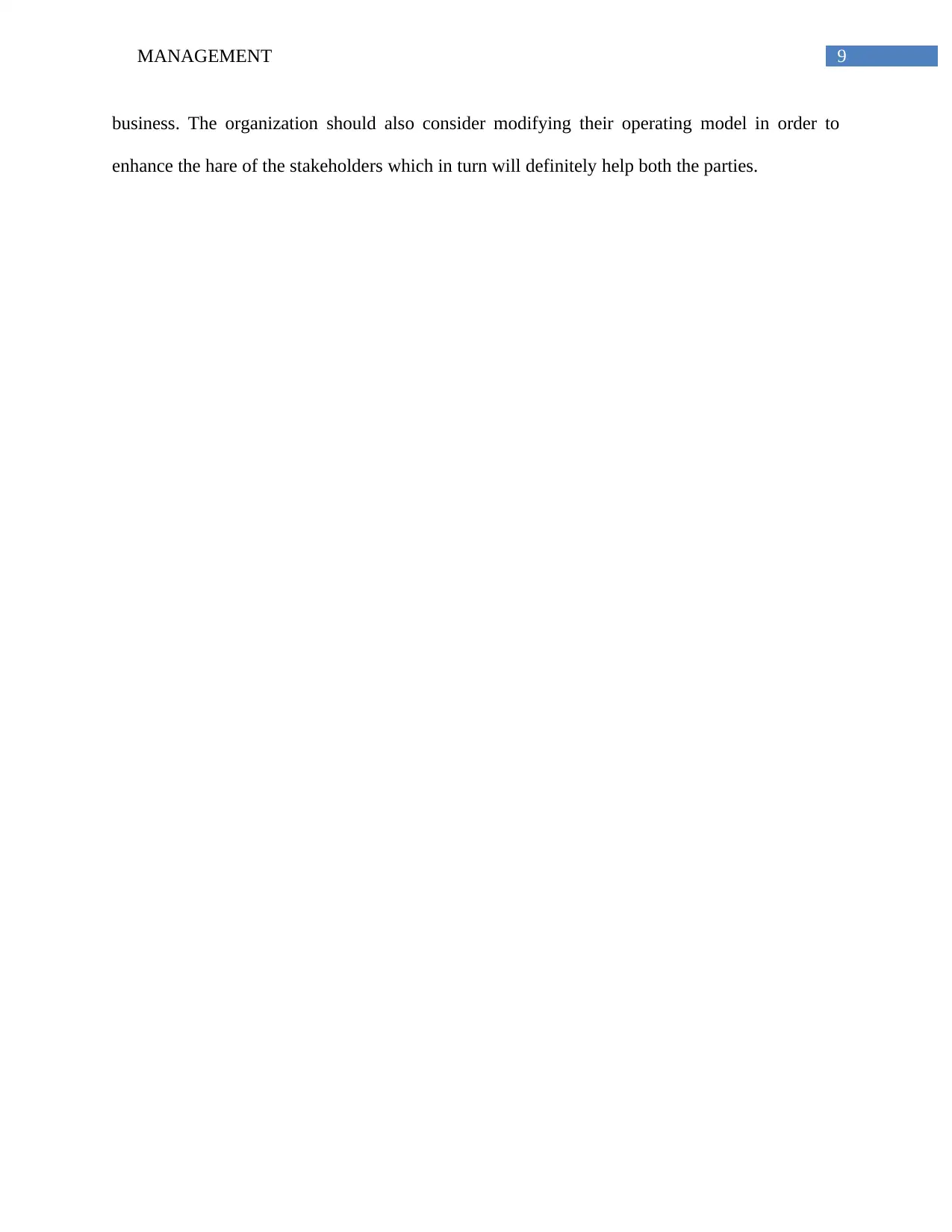
9MANAGEMENT
business. The organization should also consider modifying their operating model in order to
enhance the hare of the stakeholders which in turn will definitely help both the parties.
business. The organization should also consider modifying their operating model in order to
enhance the hare of the stakeholders which in turn will definitely help both the parties.
Paraphrase This Document
Need a fresh take? Get an instant paraphrase of this document with our AI Paraphraser
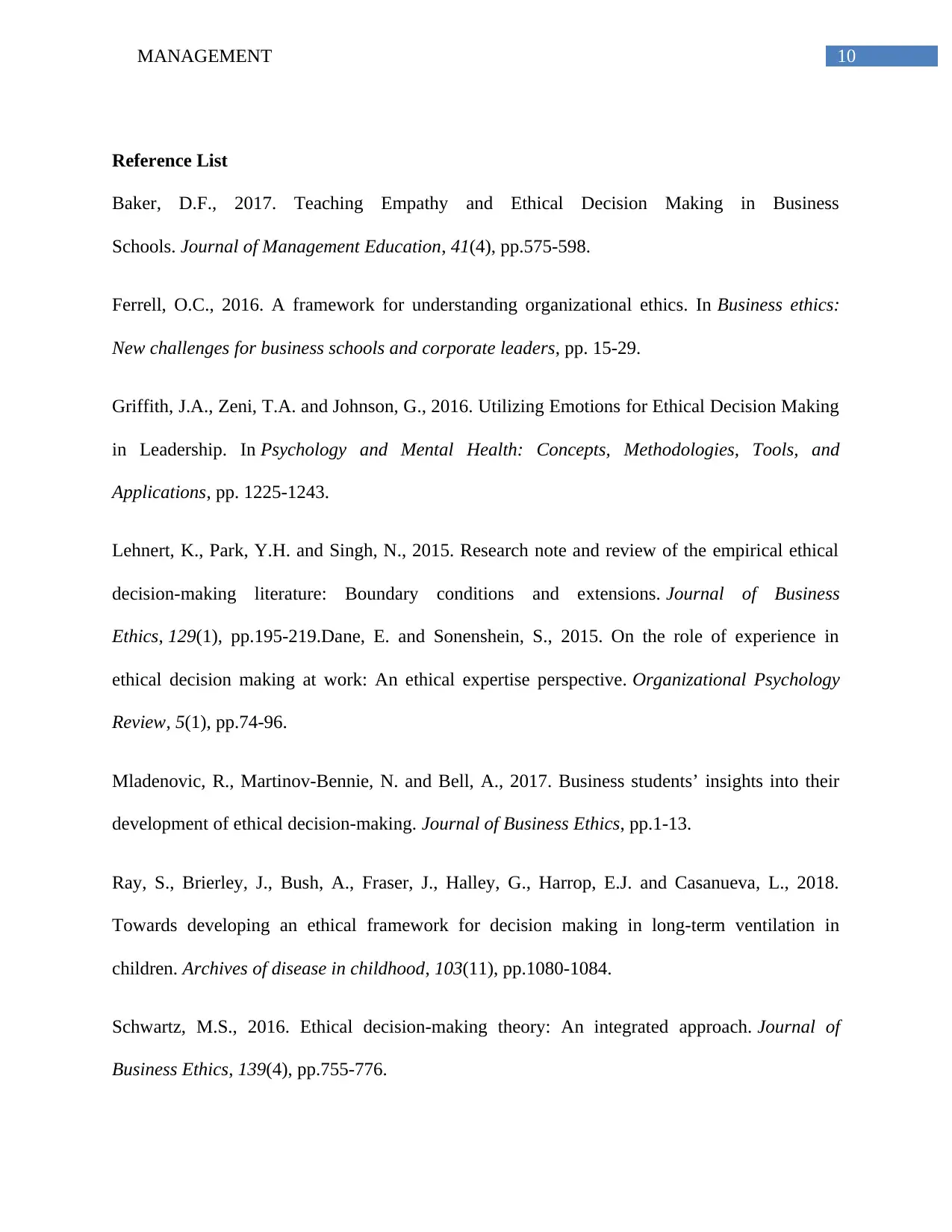
10MANAGEMENT
Reference List
Baker, D.F., 2017. Teaching Empathy and Ethical Decision Making in Business
Schools. Journal of Management Education, 41(4), pp.575-598.
Ferrell, O.C., 2016. A framework for understanding organizational ethics. In Business ethics:
New challenges for business schools and corporate leaders, pp. 15-29.
Griffith, J.A., Zeni, T.A. and Johnson, G., 2016. Utilizing Emotions for Ethical Decision Making
in Leadership. In Psychology and Mental Health: Concepts, Methodologies, Tools, and
Applications, pp. 1225-1243.
Lehnert, K., Park, Y.H. and Singh, N., 2015. Research note and review of the empirical ethical
decision-making literature: Boundary conditions and extensions. Journal of Business
Ethics, 129(1), pp.195-219.Dane, E. and Sonenshein, S., 2015. On the role of experience in
ethical decision making at work: An ethical expertise perspective. Organizational Psychology
Review, 5(1), pp.74-96.
Mladenovic, R., Martinov-Bennie, N. and Bell, A., 2017. Business students’ insights into their
development of ethical decision-making. Journal of Business Ethics, pp.1-13.
Ray, S., Brierley, J., Bush, A., Fraser, J., Halley, G., Harrop, E.J. and Casanueva, L., 2018.
Towards developing an ethical framework for decision making in long-term ventilation in
children. Archives of disease in childhood, 103(11), pp.1080-1084.
Schwartz, M.S., 2016. Ethical decision-making theory: An integrated approach. Journal of
Business Ethics, 139(4), pp.755-776.
Reference List
Baker, D.F., 2017. Teaching Empathy and Ethical Decision Making in Business
Schools. Journal of Management Education, 41(4), pp.575-598.
Ferrell, O.C., 2016. A framework for understanding organizational ethics. In Business ethics:
New challenges for business schools and corporate leaders, pp. 15-29.
Griffith, J.A., Zeni, T.A. and Johnson, G., 2016. Utilizing Emotions for Ethical Decision Making
in Leadership. In Psychology and Mental Health: Concepts, Methodologies, Tools, and
Applications, pp. 1225-1243.
Lehnert, K., Park, Y.H. and Singh, N., 2015. Research note and review of the empirical ethical
decision-making literature: Boundary conditions and extensions. Journal of Business
Ethics, 129(1), pp.195-219.Dane, E. and Sonenshein, S., 2015. On the role of experience in
ethical decision making at work: An ethical expertise perspective. Organizational Psychology
Review, 5(1), pp.74-96.
Mladenovic, R., Martinov-Bennie, N. and Bell, A., 2017. Business students’ insights into their
development of ethical decision-making. Journal of Business Ethics, pp.1-13.
Ray, S., Brierley, J., Bush, A., Fraser, J., Halley, G., Harrop, E.J. and Casanueva, L., 2018.
Towards developing an ethical framework for decision making in long-term ventilation in
children. Archives of disease in childhood, 103(11), pp.1080-1084.
Schwartz, M.S., 2016. Ethical decision-making theory: An integrated approach. Journal of
Business Ethics, 139(4), pp.755-776.
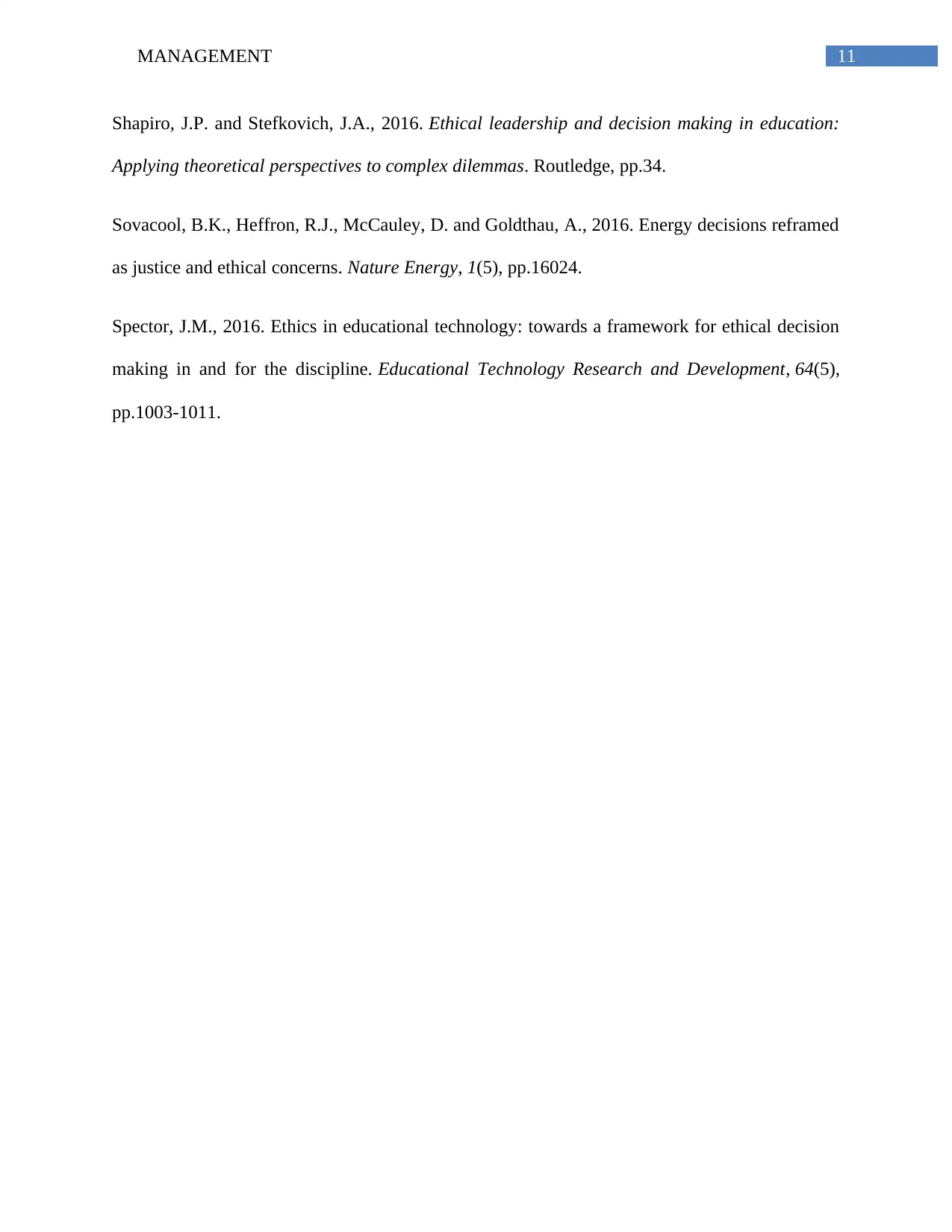
11MANAGEMENT
Shapiro, J.P. and Stefkovich, J.A., 2016. Ethical leadership and decision making in education:
Applying theoretical perspectives to complex dilemmas. Routledge, pp.34.
Sovacool, B.K., Heffron, R.J., McCauley, D. and Goldthau, A., 2016. Energy decisions reframed
as justice and ethical concerns. Nature Energy, 1(5), pp.16024.
Spector, J.M., 2016. Ethics in educational technology: towards a framework for ethical decision
making in and for the discipline. Educational Technology Research and Development, 64(5),
pp.1003-1011.
Shapiro, J.P. and Stefkovich, J.A., 2016. Ethical leadership and decision making in education:
Applying theoretical perspectives to complex dilemmas. Routledge, pp.34.
Sovacool, B.K., Heffron, R.J., McCauley, D. and Goldthau, A., 2016. Energy decisions reframed
as justice and ethical concerns. Nature Energy, 1(5), pp.16024.
Spector, J.M., 2016. Ethics in educational technology: towards a framework for ethical decision
making in and for the discipline. Educational Technology Research and Development, 64(5),
pp.1003-1011.
⊘ This is a preview!⊘
Do you want full access?
Subscribe today to unlock all pages.

Trusted by 1+ million students worldwide
1 out of 12
Related Documents
Your All-in-One AI-Powered Toolkit for Academic Success.
+13062052269
info@desklib.com
Available 24*7 on WhatsApp / Email
![[object Object]](/_next/static/media/star-bottom.7253800d.svg)
Unlock your academic potential
Copyright © 2020–2025 A2Z Services. All Rights Reserved. Developed and managed by ZUCOL.





